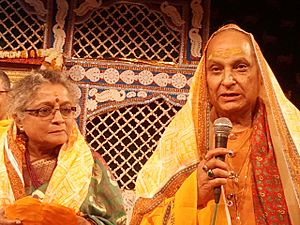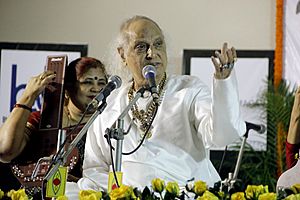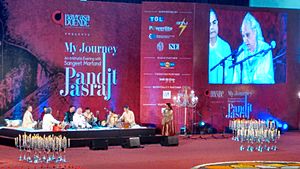Jasraj facts for kids
Quick facts for kids
Pandit Jasraj
|
|
|---|---|
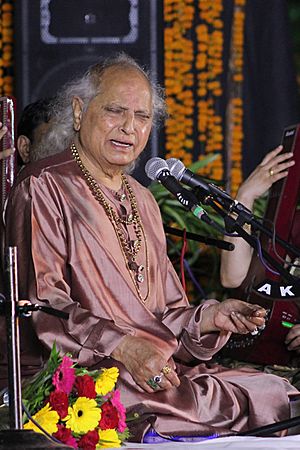
Pandit Jasraj Performing at Indira Gandhi Rashtriya Manav Sangrahalaya, Bhopal in Poonam-35 Program (2015)
|
|
| Born | 28 January 1930 |
| Died | 17 August 2020 (aged 90) New Jersey, U.S.
|
| Occupation | Singer, music teacher, tabla player |
| Spouse(s) |
Madhura Shantaram
(m. 1962) |
| Children |
|
| Relatives | Pandit Maniram (brother) Vasant Kumar Pandit (Cousin) |
| Awards | See awards and honours |
| Musical career | |
| Genres | Hindustani classical music |
| Instruments | singing, tabla |
| Years active | 1945–2020 |
Pandit Jasraj (born January 28, 1930 – died August 17, 2020) was a famous Indian singer of Hindustani classical music. He was part of the Mewati gharana, which is a special style or school of music.
His amazing music career lasted for 75 years. He became very famous both in India and around the world. Pandit Jasraj won many important awards for his talent. He performed many classical and devotional songs. He also made albums and sang for movies. He even created new music styles like Haveli Sangeeth. He helped make the Mewati Gharana style of music very popular. Pandit Jasraj also taught music to many students in India, Europe, Canada, and the United States.
Contents
Early Life and Music Beginnings
Jasraj was born on January 28, 1930. He grew up in a village called Pili Mandori. This village is in what is now Haryana, India. His family was full of classical singers. His father, Pandit Motiram, was also a classical singer.
Sadly, Jasraj's father died when he was only four years old. His oldest brother, Pandit Maniram, then taught him music. Jasraj's other older brother, Pandit Pratap Narayan, was also a great musician. He taught Jasraj to play the tabla (an Indian drum) when he was seven. But by age 14, Jasraj decided he only wanted to sing.
He spent his teenage years in Hyderabad. He also traveled to Sanand in Gujarat to learn more music. He learned from musicians of the Mewati gharana style. In 1946, Jasraj moved to Calcutta. There, he began singing classical music on the radio.
Family Life
In 1962, Jasraj married Madhura Shantaram. She was the daughter of a famous film director, V. Shantaram. They first met in 1960 in Bombay. They lived in Calcutta at first. Then they moved to Bombay in 1963.
They had two children, a son named Shaarang Dev Pandit and a daughter named Durga Jasraj. They also had three grandchildren. Madhura made a film about her husband in 2009. She also directed a Marathi film in 2010. Both her husband and Lata Mangeshkar sang in that movie.
His Amazing Music Career
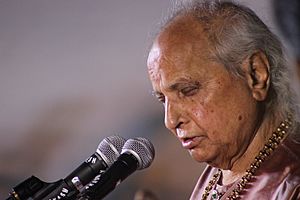
How He Trained
Jasraj first learned singing from his father. Later, he trained to play the tabla with his older brother, Pandit Pratap Narayan. He often played the tabla for his brother's singing performances. He said that the singer Begum Akhtar inspired him to become a classical musician.
Jasraj started training as a singer when he was 14. He practiced singing for about 14 hours every day! In 1952, when he was 22, he gave his first big concert. This was in the court of King Tribhuvan Bir Bikram Shah in Kathmandu, Nepal. Before becoming a stage performer, he sang on the radio for several years.
He learned classical singing from Pandit Maniram. He also learned from Jaiwant Singh Waghela and Gulam Qadir Khan. They were all from the Mewati gharana style. He also trained with Swami Vallabhdas Damulji.
His Unique Style
Classical Music
Pandit Jasraj was known for his Mewati gharana style. This style is famous for traditional khyal performances. But Jasraj sang khayals with his own special touch. He added parts from lighter music styles, like the thumri. At first, some people criticized him for mixing styles. But now, mixing elements from different gharanas (music schools) is more common.
Jasraj even created a new type of jugalbandi (a duet). He called it Jasrangi. In this style, a male and female singer sing different ragas (melodies) at the same time. He was also famous for singing rare ragas like Abiri Todi.
Semi-Classical and Popular Music
Besides classical music, Jasraj also made other music styles popular. One was Haveli Sangeet. This is a semi-classical style performed in temples. He also sang classical songs for movie soundtracks. For example, he sang 'Vandana Karo' for the film Ladki Sahyadri Ki (1966). He also sang a duet with Bhimsen Joshi for the film Birbal My Brother (1975). He even sang a song called 'Vaada Tumse Hai Vaada' for a horror film, 1920 (2008).
Every year, Jasraj organized a music festival. It was called the Pandit Motiram Pandit Maniram Sangeet Samaroh. He started it in 1972 to honor his father.
On January 28, 2017, a special concert was held. It celebrated Jasraj's 87th birthday. It also marked 80 years of his dedication to music. The concert was called My Journey, an Intimate Evening with Pandit Jasraj. It took place in New Delhi. He received a huge cheer from the audience.
Teaching Music
Pandit Jasraj taught many students who became famous classical musicians. Some of his students include Sanjeev Abhyankar, Kala Ramnath, and Tripti Mukherjee.
He also started schools for Indian classical music. These schools are in cities like Atlanta, Tampa, Vancouver, Toronto, New York, New Jersey, and Mumbai. Jasraj would spend half of each year in the United States and Canada. He would teach there or go on tours. Even at 90 years old, he taught some of his international students using Skype.
His Passing
Pandit Jasraj was in the US when the COVID-19 lockdown began. He passed away at his home in New Jersey on August 17, 2020. He was 90 years old. His body was brought back to Mumbai, India. He was cremated with special honors and a 21-gun salute.
The Prime Minister of India, Narendra Modi, said that his death "leaves a deep void in the Indian cultural sphere." He also said that Jasraj was an "exceptional mentor" to many other singers.
Awards and Honours
- Padma Shri (1975)
- Sangeet Natak Akademi Award (1987)
- Padma Bhushan (1990)
- Padma Vibhushan (2000)
- Swathi Sangeetha Puraskaram (2008)
- Sangeet Natak Akademi Fellowship (2010)
- Pu La Deshpande lifetime achievement award (2012)
- Bharat Ratna Bhimsen Joshi Classical Music Life Achievement Award (2013)
- Sumitra Charat Ram Award for Lifetime Achievement (2014)
- Marwar Sangeet Ratna Award (2014)
- Gangubai Hangal Lifetime Achievement Award (2016)
- Asteroid 300128 Panditjasraj, discovered in 2006, was named in his honour. This was announced on August 27, 2019.
- Sangeet Kala Ratna
- Master Dinanath Mangeshkar Award
- Maharashtra Gaurav Puraskar
Music He Recorded
- Raga Symphony (2009)
- Anuraag (2000)
- Devotionally Yours
- The Glory of Dawn – Morning Raagas (2005)
- Invocation (1993)
- Kanha
- Khazana (2008)
- In Concert Vancouver Vols. 1 & 2 (1997)
- Malhar – A Downpour of Music (2005)
- The Meditative Music of Pandit Jasraj
- Parampara – The Mewati Tradition
- Pride of India (2002)
- Multaani & Din-ki-Purya
- Shri Krishna Anuraag (2000)
- Songs of Krishna Vol. 1 & Vol. 2 (2000)
- The Spiritual Journey (2005)
- Baiju Bawra Vols. 1 & 2 (2008)
- Devi Upasana (2007)
- Miyan Tansen Vol 1 & Vol 2 (2006)
- Tapasya Vol. 1 (2005)
- Darbar (2003)
- Maheshwara Mantra (2002)
- Soul Food (2005)
- Haveli Sangeet (2001)
- Inspiration (2000)
- Ragas Triveni and Multani Live
- Ragas Bihagda and Gaud Giri Malhar
- Worship By Music/Live Stuggart '88
- Ornamental Voice
Songs in Movies
- "Vandana Karo" in Ladki Sahyadri Ki (1966)
- A duet with Bhimsen Joshi in Birbal My Brother (1973)
- "Neend Na Aaye" in Ek Hasina Thi (2004)
- "Vaada Tumse Hai Vaada" in 1920 (2008)
- A song in Life of Pi (2012)
See also
 In Spanish: Jasraj para niños
In Spanish: Jasraj para niños


